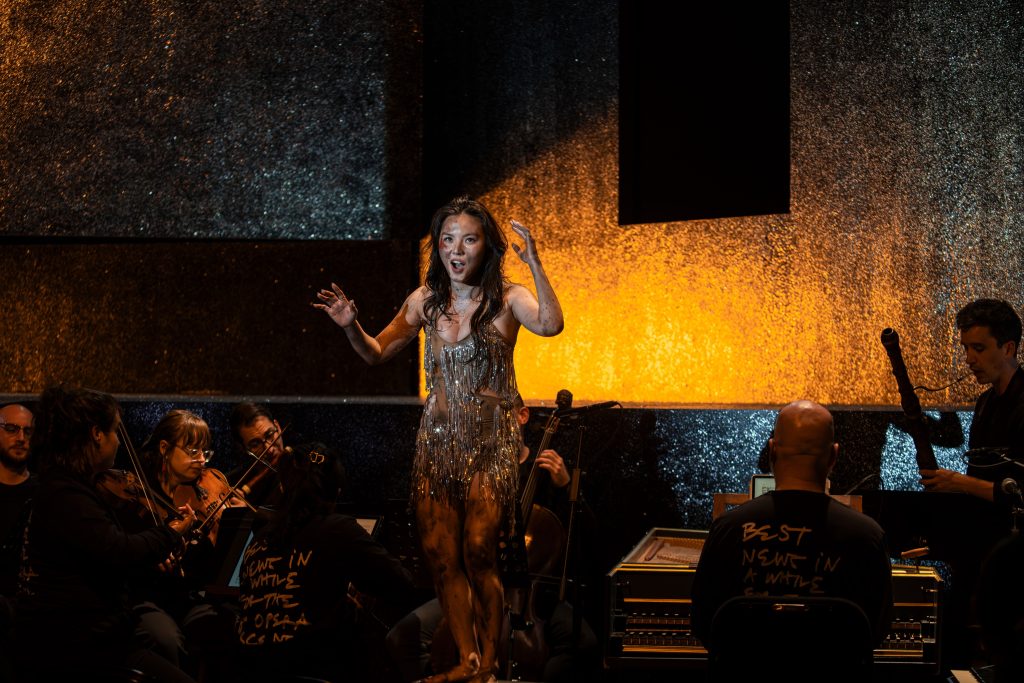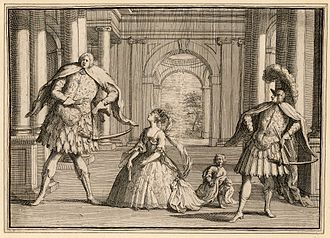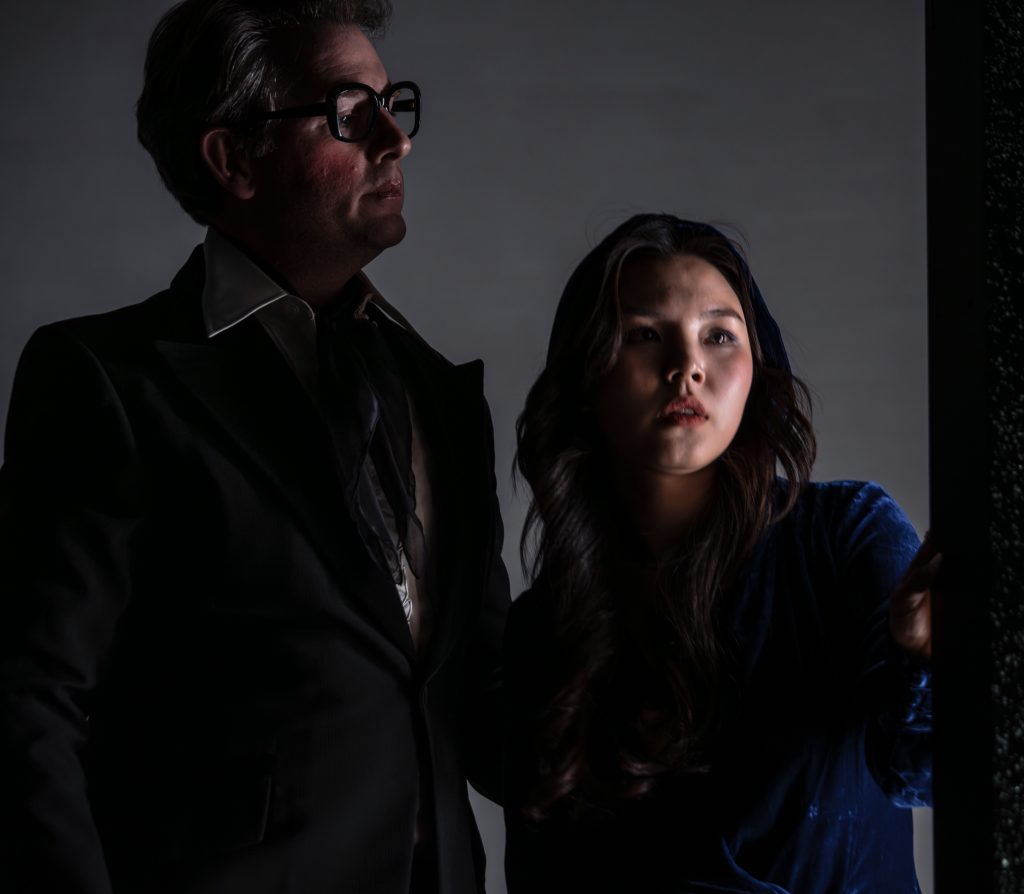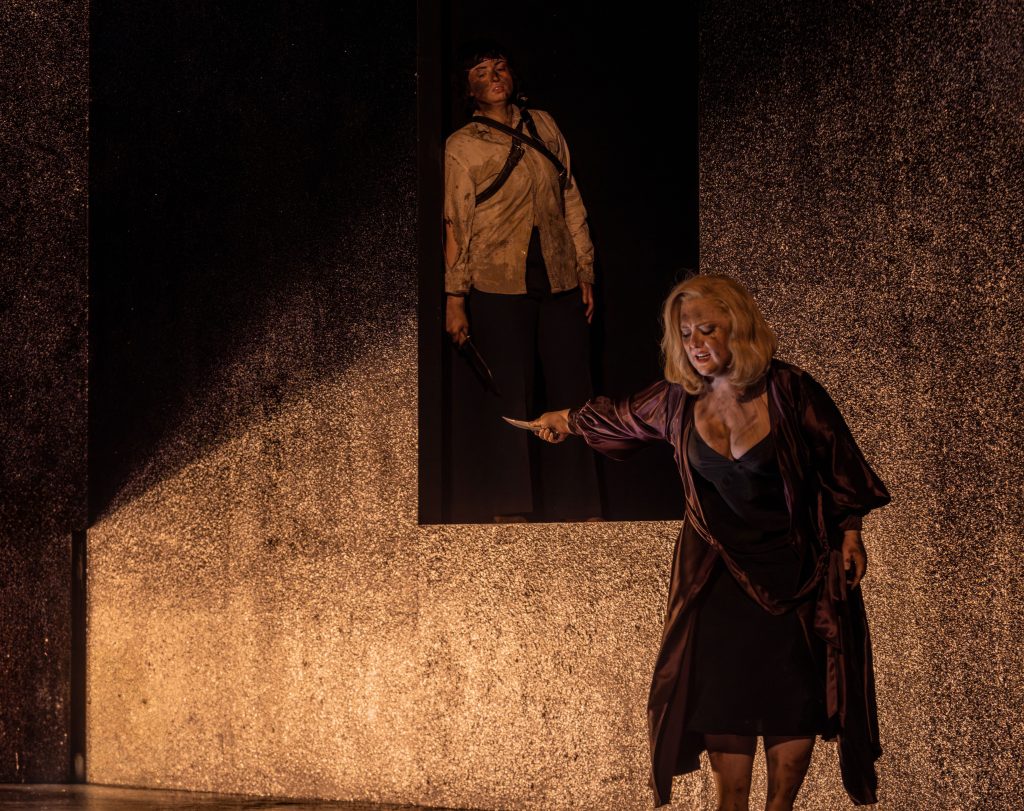
by Kevin T McEneaney
A new Giulio Cesare production by George Frideric Handel (1724) at Hudson Hall by R.B. Schlather with the early music ensemble Ruckus, sung in Italian with period libretto by Nicola Francesco Haym (his first libretto for Handel), delivers a multi-dimensional impact of exciting entertainment. Director Schlather and dramaturg Joseph Cermatori combine innovative Minimalism with dynamic Expressionism for maximum effect.
Giulio Cesare is one of the 42 Baroque operas composed by Handel, and this opera (or opera seria) was one of his most successful. While this opera is rarely performed, there are notable CD recordings and video recordings available. Handel possessed the marvelous gift of employing variations in refrains that mark refrains with an enduring originality.

Giulio Cesare is one of the 42 Baroque operas composed by Handel, and this opera (or opera seria) was one of his most successful. While this opera is rarely performed, there are notable CD recordings and video recordings available. Handel possessed the marvelous gift of employing variations in refrains that mark refrains with an enduring originality.
The above surviving drawing from a period production expresses satire in costuming. The dressage of the two men in this drawing (sometimes identified as from Giulio Cesare) finds depiction as inane fops with exaggerated, elongated bodies, while noted Italian soprano Francesca Cuzzoni has sensible period attire, thus indicating that it is the females who exhibit common sense, while the narcissistic, imperial men have no idea of the implications of their behavior and its caustic effects on others. The script has a feminist foundation for this historical, allegorical drama that offers a critique of King George I and delivers contemporary relevance about the narcissistic nature of autocracy.
If you are not familiar with Baroque drama (which is rarely performed today), you may have been surprised that Giulio Cesare was performed by a countertenor, Randall Scotting, with an intense intimation of feckless insecurity rather than the stern confidence of a legendary ruler, but that is precisely the point in this drama where it is only the women who possess a moral conscience. Countertenors and alto castratos ruled as the leading roles during the Baroque period. The perfection of Handel’s tonal mood schemes offers remarkable consistency.

In this story set in 48-47 BC, Tolomeo, the Egyptian Pharaoh, superbly sung by the determined Chuanyuan Liu, is a thug and abuser of women who demands to have sex with Cornelia, Pompey’s deceased wife, sung by Mezzo-soprano Meridian Prall with sublime disdain and dignified self-respect that filled me with wonder.
Cleopatra, marvelously sung by Soprano Song Hee Lee, remains the most layered, intelligent, complex character in the opera (and was such in recorded history). Both Cornelia and Cleopatra deliver the most heart-wrenching arias of pathos, wherein Handel’s music embodies the various shades of exquisite, deep pathos in F-sharp minor.
This diptych structure of the two female protagonists carries the drama’s central theme: life is about love, and it is love, not war or murder, that conquers in a sane and healthy society. Cleopatra is both a victim and the warm-hearted, sensible, successful star of the drama. Cesare remains primarily a speculating bystander who lucks out.
I was very impressed by the elegant resonance of Soprano Raha Mirzadegan as Sesto, the stepson of Cornelia. Douglas Ray Williams was appropriately menacing as the General and advisor to the Pharaoh. Mathew Deming as Nireno, the servant of both the Pharaoh and Cleopatra, was convincing in his duality. Baritone Rolfe Dauz as Cesare’s General suavely knew the real score of what was happening.
Despite the depressing plot line of abused women, Schlather and Cermatori have introduced a surprising innovation: noted dancer Davon Rainey performed silent, remarkable interlude dancing skits that were witty, satiric, and attractively entertaining. These mime skits mocking the inanity of history embellish the theme of history as a feminine rather than male story.
Another attractive aspect is that the stage contains a runway into the audience, which sometimes has the effect of the players dissolving and vanishing into the audience as phantoms of history.

The music ensemble Ruckus played with an intense, subtle texture and taught unison. Elliot Figg on the harpsichord was immaculate, while Paul Holmes Morton on guitar and theorbo was outstanding, and Coleman Itzkof on cello was magnificent. (Handel played the violin and cello.)
The playbill is informative and excellent. I have one complaint about this ingenious production: on the over-script translation board, I could easily read the script when the background was black and the lettering was in white, while I could sometimes read the board when the background appeared in gray, while I could not read the board at all when the background was in orange.
If you have an interest in opera, this is a production you should not miss. This fantastic production (which one may want to see more than once) runs until May 2. I hope and expect that this production will have long touring legs. Unfortunately, this production will not appear at the Kennedy Center. This production was assisted by the wisdom of the New York State Council on the Arts. Tickets can be purchased online at: https://hudsonhall.org/event/giulio-cesare/
All high res performance photos are by Matthew Placek.
P.S. While Giulio Cesare was conducting his dalliance with Cleopatra, many of his soldiers deserted by seizing ships at night. Cesare ordered all his ships (except his flagship) to be burnt. The Alexandrian Library extended to the docks, so much of it burned as the fire got out of control. This was one of the three famous burnings of the library, and this burning likely resulted in the loss of all the plays of the Greek dramatists.